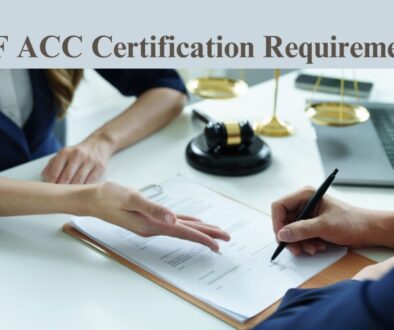Become an Associate Certified Coach (ACC): Your Guide to ICF Level 1 Certification
A Coaching Credential is valuable for individuals aiming to enhance their coaching skills and advance in the coaching profession. The ICF offers a variety of credentials, including the Associate Certified Coach (ACC), which is designed for aspiring coaches who want to gain an in-depth understanding of coaching skills, competencies, and Approaches. Getting your Associate Certified Coach (ACC) Credential from the ICF is a big step in your coaching journey, and it opens the door for professional growth and recognition in the coaching community.
ICF ACC Requirements: Education, Experience, and Mentor Coaching
The ACC credential showcases that coaches have a good understanding of the ICF Core Competencies of coaching, the ICF Code of Ethics, and the definition of coaching. It’s meant for coaches early in their careers and professionals looking to incorporate coaching into their practice.
The ICF ACC certification signifies that the individual has the necessary knowledge, skills, and understanding of core coaching principles to build a strong foundation for coaching practice. ACC coaches must also show ongoing professional development to keep their ACC status.
At the ACC level, 60 hours of coach-specific education are required. This education may be earned through one or more ICF–accredited or non-accredited programs. Your Credential application path is determined by the type of education you received.
ICF Level 1 / ICF Level 2 / ACTP Path
ICF Level 1, ICF Level 2, and Accredited Coach Training Programs have built into their program the education hours, mentor coaching, and performance evaluation required to earn an ICF ACC Credential. You will submit your program certificate and coaching experience hours in your credential application if you have completed any of these education program types. Once the application review process is complete, you will take the ICF Credentialing Exam.
Experience Requirements for ICF Level 1 Certification
Candidates for the ACC ICF Certification Credential must have at least 100 hours of coaching experience following the start of their coach-specific education. Coaches must attest to this experience as part of the application.
The experience hours must have been with at least eight clients, and 25 must have occurred within 18 months before submitting the credential application. Of the 100 or more coaching experience hours, at least 75 of the hours must be paid.
Mentor Coaching Requirements
Candidates on the associate certified coach certification and Portfolio application paths must document at least 10 hours of Mentor Coaching on their application. Candidates on the Level 1 / Level 2 / ACTP application path completed Mentor Coaching as part of their coaching education program. The Mentor Coaching hours must occur over three months or longer. Example: If the first session is March 14, the last must be June 14 or after. Of the 10 hours of mentoring, three hours must be one-on-one. The remaining seven hours may be one-on-one or in a group.
For the ACC Credential, the Mentor Coach must be a current ICF Credential-holder in good standing at the PCC or MCC level or be at the ACC level in good standing and have renewed their credential at least once. Candidates on the ACC ACSTH and Portfolio application paths must pass a performance evaluation.
This evaluation consists of an ICF Assessor reviewing a recorded coaching session with a transcript submitted by the applicant. Candidates on the Level 1 / Level 2 / ACTP application path passed a performance evaluation as part of completing their coaching education program.
The coaching session must be with a regular client who has hired you as a coach and not in any other capacity. It must last between 20 and 60 minutes. Regardless of application path, all candidates for the ACC credential must pass a computer-based written exam administered by ICF Credentials and Standards. The ICF Credentialing Exam is a tool designed to measure a coach’s knowledge of and ability to apply the ICF definition of coaching, ICF Core Competencies, and ICF Code of Ethics.
Launching Your Coaching Career with the ACC Credential:
Beginning your coaching career with an ACC credential is a significant step towards becoming a professional coach. Enhance your credibility with an ACC credential from International Coaching Federation, showcasing your experience and integrity. Display the ACC credential on your professional brand, resume, online profile, and marketing materials. Engage with the coaching community by networking, attending events, and cultivating relationships for career advancement.
Take on various coaching roles, including corporate and executive coaching, using your ACC credential to bolster credibility. Keep up with the latest industry trends by continuously training and refining your coaching skills. Apply the core competencies you acquired during your ACC certification to deliver high-quality coaching that empowers clients. Gather client feedback to demonstrate the value of your coaching services. Stay connected with ICF for ongoing support, resources, and career growth opportunities. Utilize your ACC credential to position yourself as a trusted and competent coach in your field.






